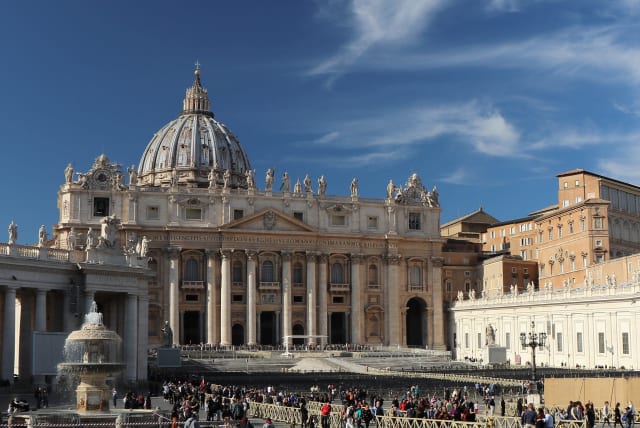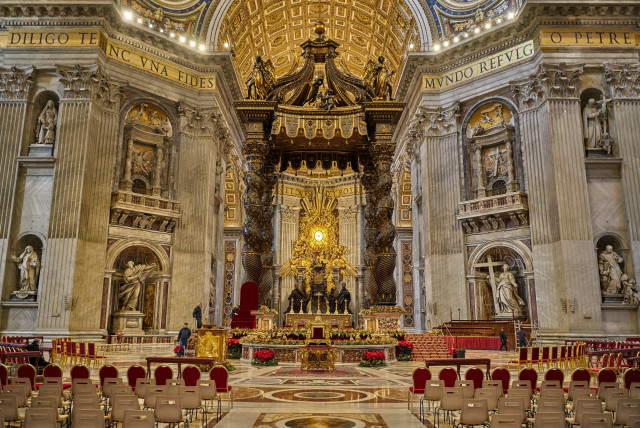Israeli scholars delve into Vatican’s Hebrew manuscript collection

A group of over 20 Christian and Jewish clergy and scholars from around the world came together to delve into the treasures of the Vatican's Hebrew manuscript collection.
A group of over 20 Christian and Jewish clergy and scholars from around the world came together last week at the Vatican to delve into the treasures of its Hebrew manuscript collection.
In the heart of the Vatican, where ancient corridors echo with centuries of history, an extraordinary gathering of over 20 Christian and Jewish clergy and scholars from around the world came together for a once-in-a-lifetime experience – a captivating journey through time, delving into the treasures of the Vatican’s Hebrew manuscript collection.
In December 2022, within the framework of the Heschel Mission to Rome, organized by the Seminario, Rabbi Ariel Stofenmacher was able to access the Vatican Library archives to review the Hebrew manuscripts. After this experience, the Seminario proposed to extend this access to others, and Pope Francis agreed to the request, as a joint initiative with the Seminario Rabínico Latinoamericano, celebrating 30 years of diplomatic relations between the State of Israel and the Holy See.
The program consists of an intensive week in Rome and 10 distance learning classes, and had the academic support of the Pontificia Università Gregoriana, and the institutional backing of the Israeli Embassy to the Holy See, the Argentinian Embassy to the Holy See and Argentine Ministry of Education.
A group of lecturers and participants gathered at the Vatican, under the leadership of Msg. Angelo Vincenzo Zani – Librarian, Rabbi Ariel Stofenmacher, Dr. Delio Proverbio, Scriptor Orientalis, Dr. Claudia Montuschi, Scriptor Latinus and Director of the Manuscripts Department and Flavia Vaccarezza. Dr. Guillermo Heisinger is the general coordinator of the Program.
Rabbi Prof. David Golinkin, president of The Schechter Institutes, and Dr. Adolfo Roitman, the renowned curator of the Dead Sea Scrolls, stood as the Israeli representatives. The participants immersed themselves in a remarkable experience, exploring Hebrew manuscripts that date back to the 10th century. This ecumenical and academic conference, became a momentous occasion for inter-faith dialogue and the discovery of shared cultural heritage.
Golinkin, a distinguished expert in Talmud, Midrash, and Jewish law, eagerly unveiled the significance of the Vatican Library’s Hebrew manuscript collection.
“The Vatican Library holds a rich and varied collection of over 800 Hebrew manuscripts, including extremely old and rare manuscripts of the Talmud Yerushalmi, Sifra on Leviticus,” which he revealed to The Jerusalem Post upon returning to Israel this week.
Complex history of Jewish-Catholic relations
The intrigue deepened as Golinkin took the participants on a captivating journey through time, shedding light on Christian censorship of printed versions of the Talmud and other Jewish books.
Roitman, equally enthralled by the atmosphere, offered his own insights during the Seminar. As a leading authority on Second Temple Jewish Literature and Religion, he masterfully delved into the textual variants present in the Dead Sea Scrolls versus the Masoretic and the LXX versions (Codex Vaticanus). The audience was spellbound by his discussion on Qumran’s exegesis, particularly the mysterious Pesher Habakkuk and 11QMelchizedek (11Q13).
However, beyond the academic pursuits, the Seminar became a true testament to the power of collaboration. Jewish and Christian scholars sat side by side, leafing through ancient Hebrew manuscripts, fostering mutual understanding and appreciation for each other’s cultural heritage.
Throughout history, Jews and Catholics have faced complex relations, with moments of cooperation and tension. Medieval Europe witnessed discriminatory policies and anti-Jewish sentiment under Catholic rule, including forced expulsions and segregation.
Theological differences and historical misunderstandings also contributed to strained relations. In modern times, efforts towards dialogue and reconciliation, such as the Second Vatican Council’s declaration “Nostra Aetate,” have fostered a more nuanced relationship. The recent landmark Seminar on Hebrew manuscripts at the Vatican exemplified the ongoing quest for understanding and cooperation between these two communities.
The Vatican Apostolic Library, known as the ‘Pope’s Library,’ enfolded the participants in its timeless embrace. With manuscripts and materials dating back to the 5th century, it held the legacy of a profound journey through time – a testament to the enduring connection between Jewish heritage and the Vatican’s rich historical legacy.
In 2008, three Israeli scholars published a complete catalog of all the Hebrew manuscripts at the Vatican. This catalog includes all the Hebrew manuscripts in their possession until 2008.
For his part, Rabbi Ariel Stofenmacher emphasized: “This is the Pope of fraternal dialogue, the one who generates amazing things like this unique study program, unthinkable only a short time ago. On behalf of the Jewish people, I thank Francis for opening this cultural heritage that is so precious to us’. Trying to interpret the same spirit as Francis, we returned today accompanied by some 20 researchers from different religions and different parts of the world who will enrich many religious communities. We believe that we must fight the injustices and evils of the world by promoting our shared values and working together’.
“We are extremely grateful to our brothers at the Vatican Library for their magnanimity in opening their doors and hearts to us to pursue what, for us, began as a simple dream a year ago,” the Rabbi concluded.
S.R.C. Librarian H.E. Most Rev. Monsignor Zani expressed his gratitude for this occasion: “I am pleased to resume the discourse begun with you last December, on the occasion of your meeting (the Seminario) with Pope Francis, in which important and highly topical issues were addressed.”
As the Holy Father had occasion to emphasize in the encyclical Fratelli tutti, “to approach each other, to express ourselves, to listen to each other, to look at each other, to get to know each other, to try to understand each other, to seek points of contact, all this is summed up in the verb ‘to dialogue’. To meet and help each other we need to have a dialogue. Today, indeed, we are here to continue together and to deepen this dialogue.
“Welcoming with gratitude and appreciation this relevant study program, from which we are strongly convinced that fruitful and significant research paths will spring for the disciplines it touches, we wish to confirm our adherence to the original project desired by the popes, who have always been clear that culture and knowledge play a decisive role within the mission of the Church.”
Jerusalem Post Store
`; document.getElementById("linkPremium").innerHTML = cont; var divWithLink = document.getElementById("premium-link"); if (divWithLink !== null && divWithLink !== 'undefined') { divWithLink.style.border = "solid 1px #cb0f3e"; divWithLink.style.textAlign = "center"; divWithLink.style.marginBottom = "15px"; divWithLink.style.marginTop = "15px"; divWithLink.style.width = "100%"; divWithLink.style.backgroundColor = "#122952"; divWithLink.style.color = "#ffffff"; divWithLink.style.lineHeight = "1.5"; } } (function (v, i) { });

